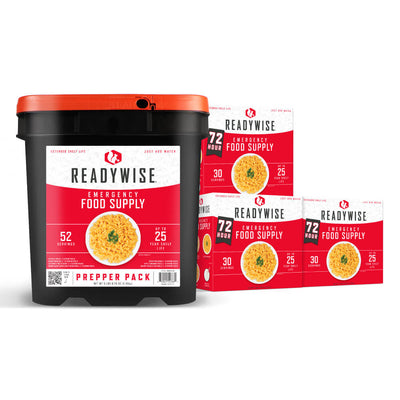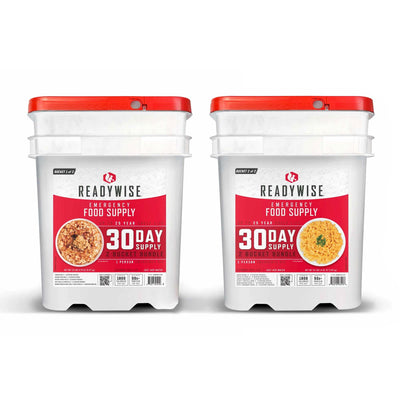How to Store Water for an Emergency
Water is essential for survival and an absolute necessity when preparing an emergency supply kit. In the aftermath of a disaster, clean drinking water may not be available. Water in your home may be cut off or contaminated with raw sewage. If grocery stores are open, the huge demand for bottled water may deplete shelves within minutes, without a viable way for stores to promptly restock. So, what is the best way to store emergency water? Let's dive in.
How Much Water Should You Store?
Most experts suggest storing at least one gallon of water per person to last three days. A normally active person needs to drink about three quarters of a gallon of fluid a day, derived from water and other beverages. This amount may increase based on a person’s age, health, physical condition, activities, diet, and climate. If you have pets, you also need to take their needs into consideration. The following are basic guidelines:
• One gallon of water per person per day, for drinking and sanitation.
• Children, nursing mothers, and people with health conditions may need more water.
• If you live in a warm weather climate, you’ll need more; in very hot temperatures, you should double the amount of water.
• Store a minimum of a three-day emergency supply of water per person.
Three days of water should be enough to get you through water being shut off or contamination that can affect water supplies during natural disasters like earthquakes, tornadoes, and ice storms. Some preppers suggest storing two weeks of water per person, but many people don’t have adequate space in their house to accommodate that much water. You’ll need to decide for yourself based on your family’s circumstances if you can store water in excess of the 72-hour minimum. If you decide to store more, a large water storage tank may not take up as much room as multiple containers, although it is much harder to transport. Understanding how many days can you go without water is essential to planning, as it ensures you store enough to cover every potential scenario.
Filtered Water in BPA-Free Containers is the Best Option
Filtered water is far more environmentally friendly than buying plastic water bottles that contribute to the billions of water bottles occupying large volumes of landfill and polluting the nation’s waterways. Therefore if you can, it is best to store filtered water rather than tap water or commercially available water.
- Use BPA-Free Containers – BPA-free water bottles or containers are ideal for storing filtered water. Store the water in a cool, dark place and check your supply every 6 months to ensure it's still safe.
- Home Filtration System – If you have a home filtration system, store your own filtered water in environmentally-safe containers to reduce waste.
- Portable Filtering Solution – The Katadyn Pocket is a durable, long-lasting portable water filter with a lifetime warranty, filtering up to 13,000 gallons. It’s perfect for emergency water storage and camping trips due to its aluminum pump and ceramic filter.
- Food-Grade Storage Containers – Food-grade water storage containers are the best option for long-term storage. Wash them thoroughly with soap and water before use to avoid contamination.
- WaterBrick Stackable Water Containers – ReadyWise offers WaterBrick Stackable Water Containers in 1.6-gallon and 3.5-gallon sizes. These BPA-free, FDA-approved water safe containers are made of high-density polyethylene (HDPE) and can be stacked efficiently for maximum storage. They are highly portable with easy grip handles and can be paired with a Ventless Spigot for ease of use.
Where to Store Your Water
Choosing the right place to store your emergency water is as important as how you store it. Proper storage conditions can help ensure your water stays safe and uncontaminated. Keep these factors in mind when selecting your storage area:
- Cool, Dark Spaces – Store your water in a cool, dark area to protect it from heat and light, both of which can degrade plastic containers over time and promote bacterial growth.
- Avoid Garage or Attic – Avoid storing water in places that experience temperature extremes like your garage or attic, as fluctuating temperatures can affect the integrity of the water container.
- Off the Floor – Store water containers off the floor, especially if you're keeping them in a basement, to avoid exposure to chemicals, dirt, or pests.
Regular Maintenance of Stored Water
Even though water doesn’t spoil, it’s important to regularly check your emergency water supply. Proper maintenance can ensure that your water is still safe to drink when disaster strikes.
- Inspect Containers – Check your containers for any leaks, cracks, or other signs of wear that could compromise the water's quality.
- Replace Every 6 Months – Even if you don’t see obvious signs of contamination, replace your stored water every six months to keep it fresh.
- Label and Date – Clearly label your containers with the date they were filled so you can easily track when it’s time to replace the water.
Using Your Own Bottles
If you decide to recycle bottles for storing water, 2-liter soda bottles are a better choice than milk jugs or juice containers. The latter have milk protein and fruit sugar residues that cannot be adequately washed off. Glass containers are too heavy and can easily break, while cardboard liquid containers cannot be used for long-term storage. Remember to check the water every few months because evaporation and leakage are more common with these types of containers.
Transporting Stored Water
If you ever need to evacuate, transporting your emergency water can be challenging. Preparing for mobility can make all the difference in an emergency scenario. Here’s how to ensure your water is easy to carry when needed:
- Portable Container – Opt for a smaller, portable storage container like the WaterBrick Stackable Water Container that is easier to transport in case of evacuation.
- Water Carrier – For long-distance transport or camping, consider investing in collapsible water carriers or hydration packs that are lightweight and easy to carry.
- Test Transporting – Make sure to practice carrying your potable water storage in advance, as it can be heavier and bulkier than anticipated when filled.
Be Prepared and Stay Safe
Proper water storage is a critical step in safeguarding your family's well-being during an emergency. By taking the time to store clean, accessible water now, you're investing in peace of mind for the future. Don't wait until a disaster strikes to realize the importance of this essential resource.
Ready to enhance your emergency preparedness? Explore ReadyWise's reliable water storage solutions to find the perfect fit for your needs.
Sources:
















































































